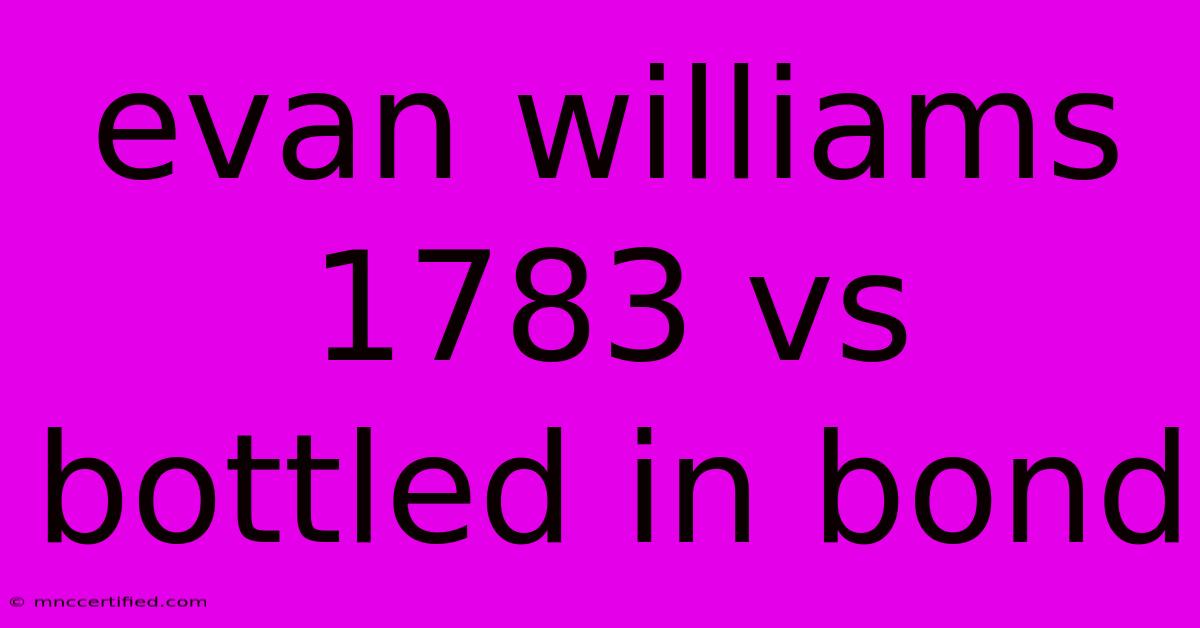Evan Williams 1783 Vs Bottled In Bond

Table of Contents
Evan Williams Bottled-in-Bond: A Deep Dive into the 1783 and Its Place in Bourbon History
Evan Williams is a household name in the world of bourbon, and for good reason. Their readily available and affordable bottlings offer a taste of Kentucky’s iconic spirit for a wide range of consumers. But when it comes to Evan Williams, one particular expression often sparks conversation: the Evan Williams Bottled-in-Bond 1783.
This article delves into the history behind this popular bourbon and explores the meaning behind its “1783” moniker. We'll also discuss the unique characteristics that set it apart from other Evan Williams bottlings and why it might be worth adding to your collection.
Understanding Bottled-in-Bond
Before we dive into the 1783, let's quickly understand the significance of the “Bottled-in-Bond” designation. This designation, established in 1897, comes with specific regulations that dictate the production of a bourbon. These regulations include:
- Age: Bottled-in-bond bourbons must be aged for at least four years.
- Proof: The bottled proof must be between 100 and 125 proof (50-62.5% ABV).
- Distillation: The bourbon must be distilled in one distillery during a single distillation season.
- Storage: The bourbon must be stored in a federally bonded warehouse.
- Bottling: The bourbon must be bottled by the distiller.
These regulations ensure consistency and quality, making bottled-in-bond bourbons a trustworthy choice for bourbon enthusiasts.
The Significance of “1783”
The year 1783 holds a special place in American history. It marks the end of the Revolutionary War and the birth of a new nation. It also happens to be the year Evan Williams, a Welsh immigrant, arrived in Kentucky and established his distillery, marking the beginning of his legacy in the bourbon industry.
While the 1783 designation is not a precise reflection of the exact year Evan Williams's original distillery was founded, it serves as a symbolic nod to his historical contribution to American whiskey making. The 1783 moniker on the bottle is a clever marketing strategy that plays on the romantic idea of a pioneer crafting his own whiskey in the early days of America.
Evan Williams Bottled-in-Bond 1783: Tasting Notes
Now, let's talk about the actual bourbon! The Evan Williams Bottled-in-Bond 1783 offers a classic bourbon experience, showcasing notes of:
- Aroma: Caramel, vanilla, toasted oak, and a touch of cinnamon.
- Palate: Sweet and balanced with notes of honey, brown sugar, and spice.
- Finish: Smooth and lingering with hints of oak and leather.
This bourbon is readily available at a reasonable price point, making it a great entry point for those new to bottled-in-bond expressions. While not a complex or particularly nuanced whiskey, it offers a pleasant and familiar bourbon experience that remains true to its historical roots.
Is the Evan Williams Bottled-in-Bond 1783 Worth Trying?
The Evan Williams Bottled-in-Bond 1783 is a solid choice for casual bourbon drinkers looking for a reliable and affordable bottled-in-bond option. Its historical significance and classic flavor profile make it a good starting point for exploring the world of bourbon.
However, seasoned whiskey connoisseurs may find its flavor profile to be somewhat basic and predictable. For those seeking more complexity and depth, there are other, more nuanced bottled-in-bond bourbons available on the market.
Ultimately, deciding whether or not the Evan Williams Bottled-in-Bond 1783 is worth trying is a matter of personal preference. If you're looking for a well-made, budget-friendly bottled-in-bond bourbon with a historical connection, this expression may be a good fit for you.

Thank you for visiting our website wich cover about Evan Williams 1783 Vs Bottled In Bond. We hope the information provided has been useful to you. Feel free to contact us if you have any questions or need further assistance. See you next time and dont miss to bookmark.
Featured Posts
-
Hoggs Wife Speaks After Captain Admits
Nov 10, 2024
-
Nepal Vs Thailand U 19 Womens T20 Asia Qualifiers
Nov 10, 2024
-
U 19 Asia Qualifiers Nepal Vs Thailand Match Today
Nov 10, 2024
-
Aesthetic Nurse Malpractice Insurance
Nov 10, 2024
-
Dae Quan Wrights Arkansas Touchdown Highlights
Nov 10, 2024